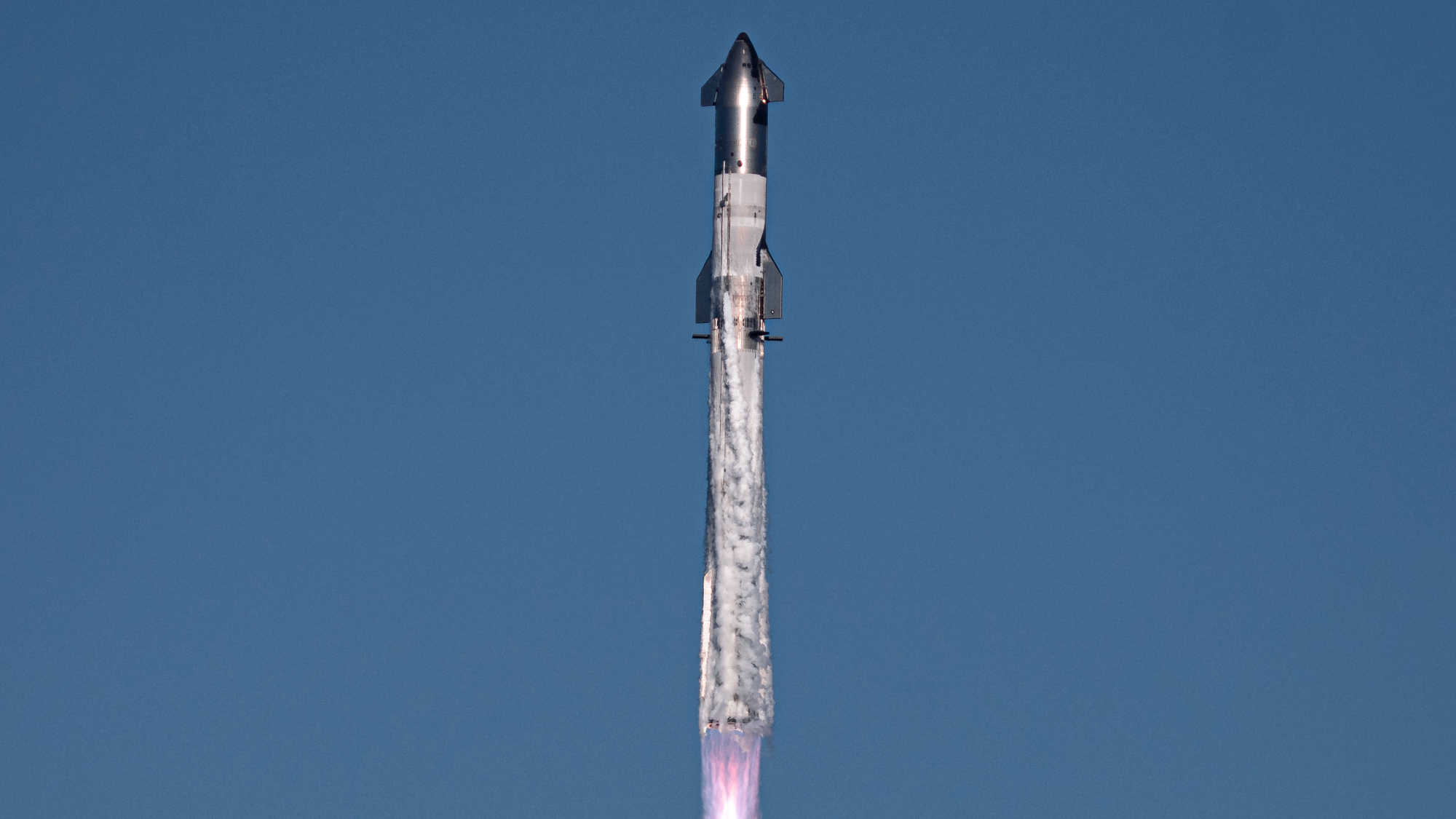
SpaceX wants to ramp up flights of its Starship megarocket next year, and regulations apparently won't stand in the way.
On Wednesday (Nov. 20), the U.S. Federal Aviation Administration (FAA) released a draft environmental assessment (EA) of Starship operations at Starbase, SpaceX's facility in South Texas.
The 160-page document, which you can read here, approves the company's request to boost the number of annual Starship liftoffs from Starbase by a factor of five, from the currently allowed five to 25 — SpaceX's reported launch target for 2025.
The draft EA also approves 25 landings for both Starship elements — its Super Heavy booster and "Ship" upper stage — back at Starbase. These landings would occur at the launch tower, which would catch the returning vehicles using its "chopstick" arms. SpaceX has achieved such a catch once, snagging Super Heavy during the fifth Starship test flight on Oct. 13.
Related: What's next for SpaceX's Starship after its successful 6th test flight?
SpaceX is developing Starship, the biggest and most powerful rocket ever built, to help humanity settle the moon and Mars. The 400-foot-tall (122 meters) vehicle is designed to be fully and rapidly reusable, and SpaceX plans to eventually conduct multiple Starship launches per day.
The stainless-steel megarocket has launched six times to date, all of them test flights from Starbase. The most recent liftoff, which occurred on Tuesday (Nov. 19), was a success, though a communications issue prevented Super Heavy from coming back to Starbase for a chopsticks catch. Instead, the booster diverted to perform a controlled splashdown in the Gulf of Mexico.
Breaking space news, the latest updates on rocket launches, skywatching events and more!
The newly released EA is just a draft, so its findings are preliminary. The FAA will hold four in-person public meetings in South Texas — two apiece on Jan. 7 and Jan. 9 — and one virtual conclave on Jan. 13 to discuss the EA. You can learn more about them here.
SpaceX and its founder and CEO, Elon Musk, have complained about the FAA a lot recently, claiming that the agency has stifled Starship's progress — and the American launch industry overall — with overly burdensome regulation.
Companies in the spaceflight sector, and in most if not all other industries, will likely have freer rein to do as they please after President-elect Donald Trump takes office in January. And Musk will have a say in this effort; Trump has appointed the billionaire entrepreneur to co-lead the "Department of Government Efficiency," an advisory group that aims to help "dismantle government bureaucracy" and "slash excess regulations."
Join our Space Forums to keep talking space on the latest missions, night sky and more! And if you have a news tip, correction or comment, let us know at: community@space.com.

Michael Wall is a Senior Space Writer with Space.com and joined the team in 2010. He primarily covers exoplanets, spaceflight and military space, but has been known to dabble in the space art beat. His book about the search for alien life, "Out There," was published on Nov. 13, 2018. Before becoming a science writer, Michael worked as a herpetologist and wildlife biologist. He has a Ph.D. in evolutionary biology from the University of Sydney, Australia, a bachelor's degree from the University of Arizona, and a graduate certificate in science writing from the University of California, Santa Cruz. To find out what his latest project is, you can follow Michael on Twitter.
-
Torbjorn Larsson The latest Starship reentry fielded basic uncertainties of e.g. the heat shield, while they lost tiles the robustness and dynamic stability of the aggressively angled belly flop (massive engines up relative to center of mass) looks good enough.Reply
So it looks promising.
These landings would occur at the launch tower,
Actually the next launch-and-catch tower will handle the lengthened boosters next year. Next launch will be the v2 Starship (longer, more shielded front fins), but as soon as the next and higher tower can take the v3 lengthened booster the whole v3 migration will be complete.
Presumably the old launch tower supports Starship catches, until the Florida towers are completed.
? No, I don't know that tune. The election hasn't changed anything yet, it's two more months until that happens. And the environment assessment underlying this has been ongoing for a long time and won't be finished until after that.k8do said:What a difference an election makes. Twenty four little hours (you know the tune)
The ongoing environmental review stems from SpaceX's desire to increase the scope of its operations from South Texas and is not yet finalized. Beginning today, the FAA will open a public comment period that will close on January 17. In addition, the FAA will hold five public meetings to solicit feedback from the local community and other stakeholders.
The 158-page document makes for interesting reading, and it details the extent to which the FAA and other agencies reviewed air quality, climate, water, noise, cultural, wildlife, and other impacts. In all of these areas, the federal agency concluded that the mitigations SpaceX undertook as part of the 2022 environmental review process are sufficient to account for the increase in its Texas launch activities.
However, it seems unlikely that this document—which has been in the works for more than a year—was unduly influenced by Trump's election. It was prepared by an FAA still under the Biden administration. Rather, the tone of the environmental assessment signals that SpaceX was probably already on a path to complying with federal regulations.
https://arstechnica.com/space/2024/11/spacex-just-got-exactly-what-it-wanted-from-the-faa-for-texas-starship-launches/
If you expect changes, FAA is a government agency. In democracies such entities are routinely separated from the government under transparent laws and regulations. This avoids e.g. corruption and compromised efficiency while ensuring freedom of speech. US is a democracy (though I gather more corrupt than most Western nations: https://en.wikipedia.org/wiki/Corruption_Perceptions_Index). -
Unclear Engineer ReplyTorbjorn Larsson said:In democracies such entities are routinely separated from the government under transparent laws and regulations. This avoids e.g. corruption and compromised efficiency while ensuring freedom of speech.
Speaking from inside experience, I can say that the U.S. regulatory agencies are not perfectly shielded from political pressure.
But, they are resistant to it.
And that is what the new administration intends to fight against, this time.
During the previous Trump administration, a new process (new "Schedule F") was introduced and in-progress to change the top levels of Civil Service technical employees from protected status to "serves-at-the-pleasure" status so that they would have to obey the political pressures.
That was stopped by the following (Biden) administration, but will most likely be more fully implemented this time due to the next Trump administration having majorities in both houses of Congress to make any needed changes to the implementing legislation for the agencies and the Civil Service.
However, the lower levels of most of the Federal agencies have employee unions, who will resist political and administrative pressures on those employees. The unions have actually been more effective than the enacted laws in shielding the employees from political pressures.
But, that is not to say that the Civil Service employees in a particular agency do not develop individual internal "cultures" that are never out-of-step with what the public supports in the way of government actions. Don't just assume that something is correct because it is the position of a regulatory agency. That was actually a legal presumption recognized by the courts (called the "Chevron Defense") until it was recently overturned by a U.S. Supreme Court decision.
I am expecting a lot of disruption in Federal agencies. I just hope it does not lead to them becoming as disfunctional as our Congress has become when it is almost evenly split on the political spectrum.
